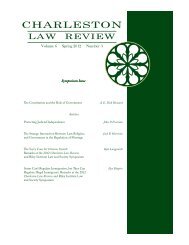Volume 5 Winter 2011 Number 2 - Charleston Law Review
Volume 5 Winter 2011 Number 2 - Charleston Law Review
Volume 5 Winter 2011 Number 2 - Charleston Law Review
Create successful ePaper yourself
Turn your PDF publications into a flip-book with our unique Google optimized e-Paper software.
CHARLESTON LAW REVIEW [<strong>Volume</strong> 5Start with the question of what a client wants when he or shehires a lawyer. Whether the client is a large corporation seekinghelp in a securities transaction or an individual going through adivorce, there is no reason to think that a legal consumer wantsanything less than what a person buying a toaster at Walmartwants: value. As one commentator put it, “Overall, clients wantto pay a fair price for a reasonable amount of quality service.” 49The concept of the billable hour attempts to address that need bypricing the service—which is the product—based on the lawyer’seffort. Inherent in the hourly rate is recognition of the lawyer’sknowledge, competency, experience, and historical results insimilar matters. Thus, one lawyer may charge $400 per hourwhile another may charge $200 per hour for the same type oflegal work.Clients also want predictable legal fees that they can budgetfor, regardless of whether the client is Exxon Mobil or Jane Doe.Clients want to spend as little money as necessary to get thehighest quality legal representation that they can afford. This issimply another way of saying that, for all its declarations ofprofessionalism, lawyers provide a product not unlike Sony whenit sells a high-definition television set. As discussed in moredetail below, the average buyer of such a television is in noposition to look inside the set and determine its actual, asopposed to stated, quality, and the average legal consumer is inno position to determine whether a particular lawyer’s work is ofreasonable quality and reasonable price.Given the client’s demands, we turn next to what a lawyerwants in his career and in a particular case. While there is alegitimate argument to be made for the psychological returns ofpracticing law (although to find it one must wade throughextensive research reporting only the negative aspects of being alawyer), 50 from an economic perspective, a lawyer, like any otherprovider of goods and services, wants to make the most money heor she can. If a lawyer gets paid by the hour, what is the surest49. Jones & Glover, supra note 11, at 293.50. See, e.g., Susan Daicoff, <strong>Law</strong>yer, Be Thyself: An Empirical Investigationof the Relationship Between the Ethic of Care, the Feeling DecisionmakingPreference, and <strong>Law</strong>yer Wellbeing, 16 VA.J.SOC.POL’Y &L. 87 (2008).180







